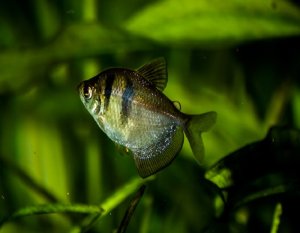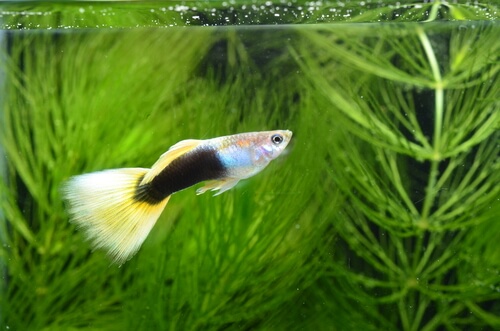
Guppy fish are among the smaller aquarium fish you can find for sale today. With bright colors and an attractive appearance, it’s no surprise why they tend to be a point of focus for most aquarists. Their appealing look is sometimes very alluring, so seeing a guppy fish losing color can be a huge concern.
If this is your current predicament, it can feel like you’re watching your pet lose its identity. However, that feeling is something that doesn’t have to be permanent. With enough knowledge, you can get better at spotting the events leading up to your guppy fish turning black or white.
Caring for a guppy fish typically entails providing adequate food, water, light, and resources to encourage a flourishing life. While these things are essential, guppy care also comes with a fair bit of preemptive action to ensure that things don’t go wrong.
This article will provide everything you need to know about guppy fish color loss. With the information covering color preservation and preventive measures, there’s enough knowledge to create an expert guppy owner out of you!
How Guppy Colors Work
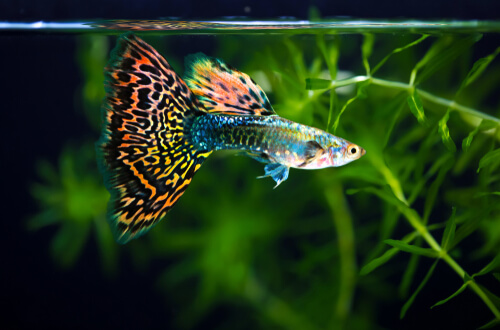
If you’ve examined guppies for even a short period, you’d have learned that colorful guppies are usually male. Meanwhile, female guppies are primarily pale gray. This design is borne out of nature and not a trait that can be influenced by breeding.
The science behind it, at least according to researchers, is down to mating. Like peacocks, wild male guppies evolved to be colorful in order to appear more attractive to mates. Meanwhile, the females never had that incentive in their evolution, so they have always been a pale gray shade.
For male baby guppies, inheriting the colors of a male parent is quite simple, as the female parent’s genes do not interfere with the male parents.
If you’ve got a bunch of new baby guppies and you don’t immediately notice the vibrant colors, it’s not a point of concern. Babies only tend to develop their colors once they’ve matured between 1-6 weeks. So by the 10th week, it should be fully colored.
Why Your Guppy Fish Is Losing Color
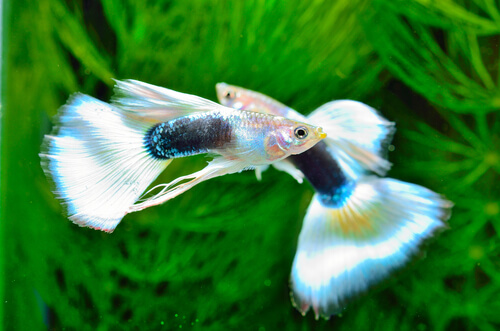
1. Stress
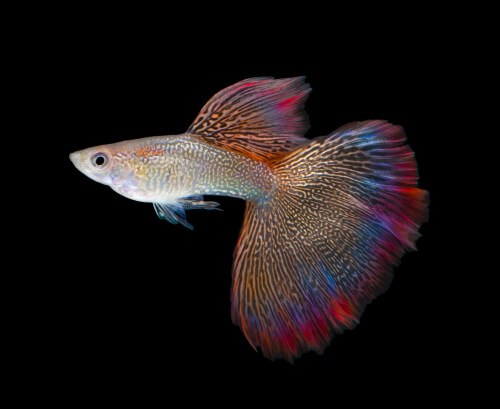
When a guppy fish is dealing with increased stress, it can display physical indicators of distress. Some of the indicators can present themselves in your guppy fish not moving and the guppy fish losing color. If your guppy is stressed, it’s best to consider what is causing the problem. When you keep a fish in your aquarium, a few essential factors need to be taken into consideration that can help limit their stress.
First, your guppy may feel intimidated if there are too many tank mates. An intimidated guppy may lose color to be less noticeable in the tank and be less of a target for bigger fish to bully. While bullying is not the only cause for guppy fish losing color, another thing to consider is that they get stressed when there’s too much competition.
When your guppy population is such that there are too many males competing for the females, things tend to get complicated quickly. The best way to curb stress and avoid your guppy fish losing color is by controlling your guppy population. In other words, creating a fair male-to-female ratio and decluttering your tank to create a feeling of freedom. For every male, have 2-3 females.
Also, you’ll want to create a lively tank environment for your guppies, so you should consider adding some plants and foliage. This can be super helpful for guppies that feel intimidated in a tank.
2. Poor Water Quality
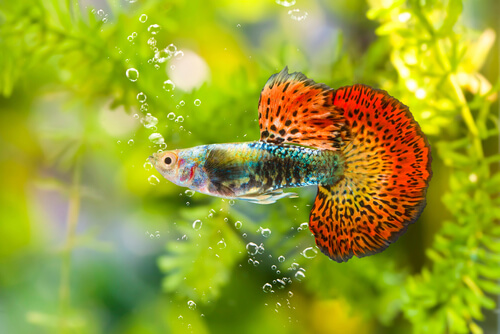
When you’ve got a tank with insufficient water quality, your guppies can lose color in only a matter of days. With the lack of nutrients and struggle to survive, you may notice your guppy fish turning black or white. This problem is highly avoidable, so it’s one that you don’t necessarily have to deal with. If you’re willing to commit to the correct tools for your tank, achieving optimal water parameters should not be a struggle.
First, you’ll need to install these handy gadgets to take the load off your back. A thermometer and filter should be a good start. Next, you will need to know the average temperatures and pH balance levels in which your guppies can thrive. Stick to these numbers and regularly check if you are in the range to ensure they are correct.
Guppy fish prefer water that sits between 72-82 degrees Fahrenheit. And the great news is that guppies are pretty hardy and do well with a pH between 7.0-8.0. Unfortunately, most aquarium fish don’t tend to enjoy pH levels this high, so you’ve also got to be considerate of their tank mates. However, swordtails, Mollies, and Honey Gouramis are all viable options for tankmates that can survive in these levels.
3. Disease
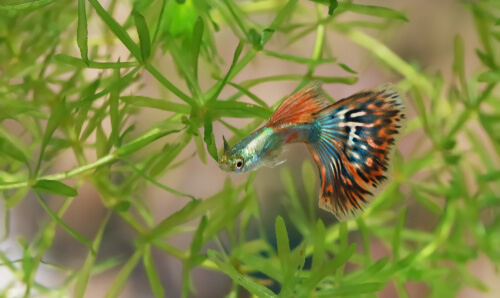
Like other aquarium fish that tend to lose color, a guppy fish turning black or white can be easily linked to a disease or infection. However, a particularly concerning one is the ich. Also known as Ichthyopthirius Multifiliis, this is a common problem with aquarium fish. If you suspect this is in your tank, you must quickly isolate the affected fish, replace the tank water and commence treatment.
A few other tank diseases also exist and come with their own harmful symptoms. Symptoms such as your guppy fish not moving can occur with fin rot, dropsy, swim bladder disease, and more. When a guppy suffers from these ailments, having a trusted vet to communicate with is one of the best things you can do.
Watching your guppy fish lose color due to a disease doesn’t have to be the end. If you can treat the problem early and effectively, your fish can make a full recovery and have its original colors restored.
4. Food
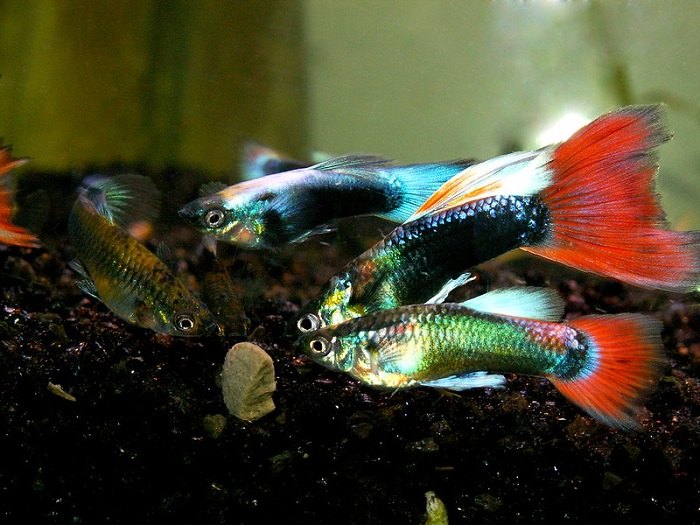
Guppies are supposed to be fed at least twice per day. If feeding habits are inappropriate, you may quickly notice your guppy fish losing color. Sticking to a balanced feeding pattern is a good idea if you want to keep it in good shape. With a good feeding pattern, you need to be more conscious of the types of meals they receive.
For example, choosing foods that can be consumed in under a minute. Guppies can easily be subjected to the consequences of overfeeding or underfeeding, so feeding them the right quantities is highly recommended.
Ensure that your guppies are given a wide variety of foods. This includes meals like bloodworms, brine shrimp, and the occasional flakes. Be sure to avoid feeding pellets or flakes consistently. Guppies tend to have a strong need for nutrients, and flakes can only do so much, which causes a deficiency in their diet. With the wrong diet, you will witness your guppy fish losing color and other problems, like your guppy fish not moving due to lethargy.
5. Artificial Coloring
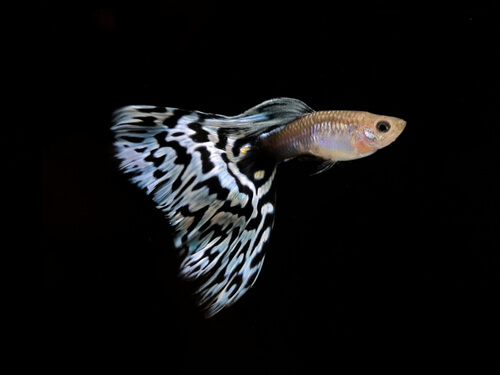
This is a pretty avoidable problem if you avoid the temptation to introduce colors to the tank at all costs. However, the real problem begins if you purchase a guppy from a store owner that uses artificial colors. If the store had been using artificial coloring, you are likely to see the color fade when you place it in your tank.
Suppose you suspect your guppy fish is losing color due to artificial coloring. In that case, you don’t need to be too concerned about its health. The only real consequence is that your guppy will return to a naturally pale appearance. This look may be less attractive, but a healthy and happy fish is still worth appreciating!
6. Age
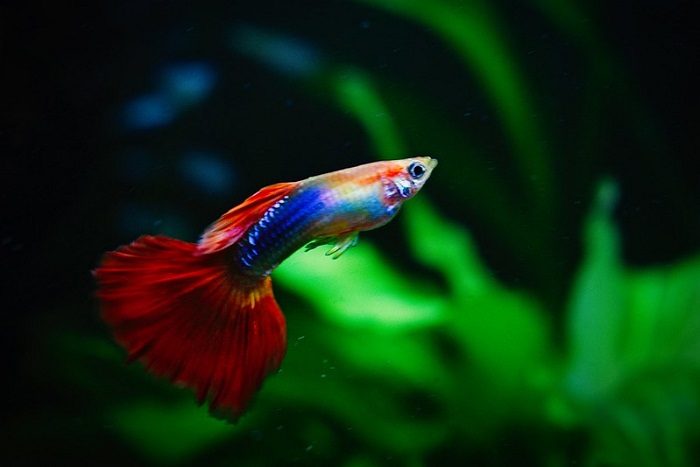
As guppies get older, their colors begin to fade. Suppose you see your senior guppy fish turning white. In that case, this is something not to worry about, especially if they are over a year old. By at least two years of age, guppies can already begin to display signs of aging, which is not too big a deal.
Ideally, you’ll want your pet to live long, but aging is just their natural process. The life expectancy for guppies can go on for up to 5 years
When a guppy loses its colors due to aging, there’s nothing you can do to restore the originally vivid colors. So instead, you need to take care of it and keep it healthy for the remainder of its life.
How To Care For A Guppy Fish That Is Losing Its Color
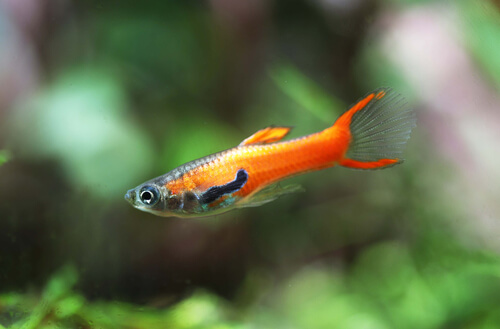
When a guppy fish begins to lose color, you can do something about it in certain scenarios. So if you are looking to learn some valuable tips for when your guppy fish is turning black or white, here they are:
1. Prevent Overcrowding
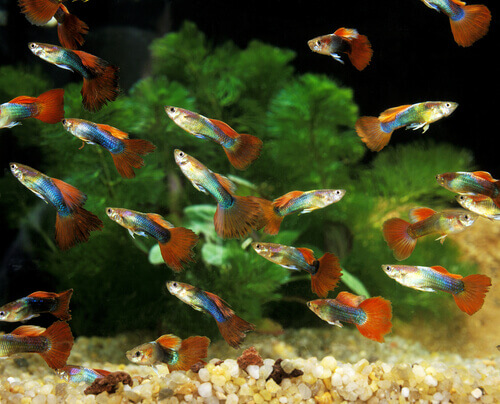
Guppy fish losing color will quickly become a significant issue if your tank is too populated. To avoid this, don’t make your guppies compete with one another. Overcrowding also increases the risks of dangerous minerals like nitrate and nitrite building up. It also messes with the tank’s cleanliness, making it difficult to maintain.
To solve this, consider buying a bigger tank to accommodate all your guppy fish. You can also get an aquarium kit to help with maintaining it better. Finally, an overcrowded tank can lead to oxygen deficiencies, contributing to your guppy fish not moving.
2. Provide Adequate Lighting
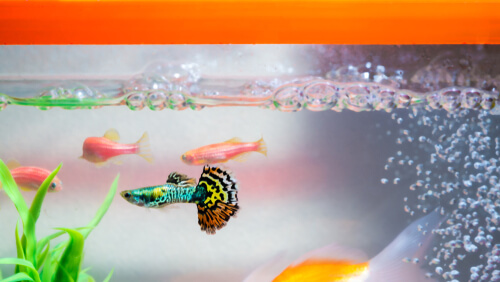
When a guppy fish is losing color due to lighting, you’ll need to introduce the right lights that can help with enhancing its appearance. In other words, it’s time to reevaluate your current lighting and see what adjustments need to be made. Also, avoid exposing your tank to direct sunlight, which can be dangerous for fish because tank temperatures can quickly fluctuate.
Consider using artificial lighting options, specifically lights that provide a warm tone to encourage colors like red, green, brown, and orange to be more visible.
3. Provide Plants
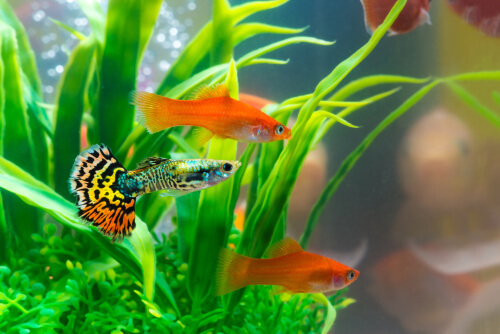
When a tank has a sufficient plant population, your fish will feel less stressed and more inclined to grow successfully. Tanks with plants are also appealing because they give more depth to your aquarium’s appearance. If a guppy fish is losing color due to stress having plants can create good hiding spots and an excellent place for your fish fry to be safely sheltered.
If you have plants you’d like to introduce, take extra care to ensure that they don’t contain parasites that can be dangerous for your guppies. Artificial plants are also an option if you want to avoid the responsibility that comes with real plants.
Final Thoughts
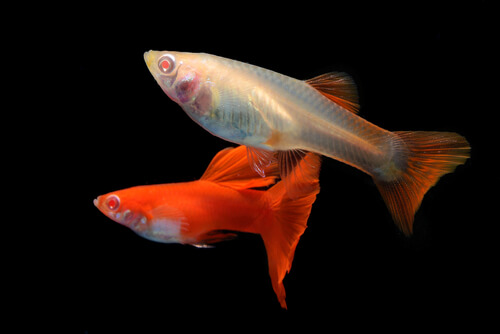
A guppy fish losing color is not an ideal situation to have in your tank. However, these problems come with the task of being an aquarist. With vital information like the content of this guide, you can make your experience more pleasant with knowledge of possible problems and the right solutions to implement.




